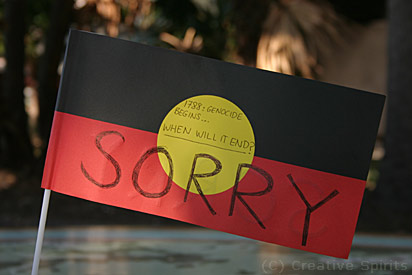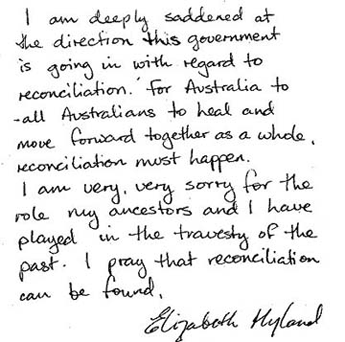History
Timeline results for
Found 1175 results for your search. Showing page 26 of 59.
1997
-
During the opening address of the Reconciliation Convention Premier Minister John Howard refers to the plight of Australia’s Aboriginal people as a mere ‘blemish’, dismissing centuries of dispossession and violence as insignificant. Indigenous delegates in the audience stand and turn their backs on the Prime Minister in protest. The PM snaps and screams at the audience in return.
In facing the realities of the past, [...] we must not join those who would portray Australia's history since 1788 as little more than a disgraceful record of imperialism [...] such an approach will be repudiated by the overwhelming majority of Australians who are proud of what this country has achieved although inevitably acknowledging the blemishes in its past history.
— Then-Prime Minister, John Howard -
The stamps in this issue are images from four animations of The Dreaming series, a video series of 13 animated stories for children, released by the Australian Film Commission in 1995 and 1997.
The images show Dumbi the owl (based on a story by David Mowaljarlai of the Hibiscus people), The Two Willy-Willies (a story told by Josie Boyle from the desert people of the Wongi nation), How Brolga Became a Bird (a story told by Pauline McLeod from the Mutti Mutti people of Lake Mungo, NSW) and Tuggan Tuggan (Silky Oak) (a story told by Oodgeroo Noonuccal from Stradbroke Island).

Left to right: Dumbi the Owl; The Two Willy-Willies; How Brolga Became an Owl; Tuggan Tuggan.
1998
-
The idea of a 'document of reconciliation' develops as a way to deal with the sensitivities and differences of view which existed about a treaty. Other terms which could be used instead of 'document of reconciliation' could be settlement, compact, covenant or declaration, or an Aboriginal word, such as Makarrata, which has an appropriate meaning.
-
National Archives Australia - Bringing Them Home Indexing Project is launched. The project is focussed on the identification and preservation of Commonwealth records related to Indigenous people and communities.
-
The federal government makes amendments to the Native Title Act which reduce protection of native title.
-
Inaugural Sorry Day. The Bringing Them Home Report had suggested "to commemorate the history of forcible removals and its effects" on May 26 (recommendation #7a). Sorry Day offered the community the opportunity to be involved in activities to acknowledge the impact of the policies of forcible removal on Australia's Indigenous populations.
Sorry Day has been an annual event since.

Sorry Day 2007. Someone had planted an Aboriginal flag on the ground expressing his sorrow for what had happened to Indigenous people. -
Federal election results in a second Aboriginal person elected to federal parliament - Senator Aden Ridgeway. He is to remain a Democrats Senator for New South Wales until 2005, the only Aboriginal person serving in the Australian parliament during that time.
-
Aboriginal people across Australia hear with shock the comments of Aboriginal Affairs Minister Senator John Herron as he says stories of widespread removal of Aboriginal children from their families were exaggerated and that the removals that did occur were for lawful reasons "as occurs under child welfare policies today."
-
Aboriginal athlete and Olympic gold medallist, Cathy Freeman, receives the Australian of the Year award. ⇒ Famous Aboriginal people
-
Nova Peris wins gold in the 200m final and the 4x100m relay at the Commonwealth Games in Kuala Lumpur, becoming the first Australian to win international gold medals in two different sports, hockey and relay.
-
Australians for Native Title (ANT) launches the Sorry Books campaign, an opportunity for everyday Australians to give a "people’s apology" for past wrongs to Aboriginal people in lieu of the federal government's refusal to make a formal apology to the Stolen Generations. ANT circulated about 1,000 books over four months in libraries, museums, churches, shops, art galleries and schools.
The UNESCO added the collection of Sorry Books to its Memory of the World Register on 10 August 2004, in recognition of their historical and social significance.


Sample Sorry Book entries. Children, celebrities, migrants and visitors alike signed Sorry Books. [1] -
HREOC releases the Social Justice Report 1998, which includes a summary of responses from the churches, and non-Indigenous community to the inquiry's recommendations plus an Implementation Progress Report.
-
One year after the Bringing Them Home report the first Sorry Day is marked by hundreds of activities around the country. The Australian federal government does not take part in ‘Sorry Day’, saying people who removed Aboriginal children thought they were doing the right thing and people now should not have to say sorry for what people did in the past. Over 1 million signatures in thousands of Sorry Books speak a different language.
-
Prime Minister John Howard vehemently opposes a treaty, instead insisting on non-binding recognition: "I hope we have some kind of written understanding. I don't like the idea of a treaty because it implies that we are two nations. We are not, we are one nation. We are all Australians before anything else, one indivisible nation.
"But I would certainly be in favour of a document that recognises the prior occupation of this country by the indigenous people, recognising their place as part of the Australian community and their right to preserve their distinctive culture. But within the notion of one undivided united Australian community where our first and foremost allegiance is to Australia and nothing else."
1999
-
Mandatory sentencing in Western Australia and the Northern Territory becomes a national issue. Many call for these laws to be overturned because they have greater impact on Indigenous children than on non-Indigenous children.
-
Federal parliament issues a statement of sincere regret over the forced removal of Aboriginal children from their families.
-
16-year-old Daniel Walbidi, from Yulparija, walks into Broome’s Short Street Gallery and asks owner Emily Rohr for painting supplies, inspiring his Yulparija elders, aged in their 70s and 80s, to start painting the stories of their ancestral desert lands they had left more than 40 years prior, and thus sparking an art movement. He went on to become one of Australia’s finest contemporary artists.
-
Forced by a growing number of complaints of racial discrimination the Queensland government agrees to make a $25 million payout to thousands of Indigenous people who were employed by previous governments on Aboriginal reserves and paid at wages under the award rate in the years 1975 to 1986. The individual payout is $7,000.
It was the first time any Queensland government openly admitted responsibility for discrimination and by far the largest settlement by any employer in respect of a discrimination matter.
I grew up hungry. My hunger and malnutrition were a direct result of my family not being paid their full wages and entitlements.
— Yvonne Butler, admitted to hospital for malnutrition in 1957 [2] -
Federal Parliament issues a statement of deep and sincere regret over the forced removal of Aboriginal children from their families.
-
Jimmy Little is inducted into the Hall of Fame of the Australian Recording Industry Association (ARIA) Music Awards.
References
View article sources (2)
[1]
Australian Institute Of Aboriginal And Torres Strait Islander Studies, Sorry Books Exhibition, www.aiatsis.gov.au/collections/exhibitions/sorrybooks/introduction.html
[2]
Stolen Wages committee submissions, www.aph.gov.au/Parliamentary_Business/Committees/Senate/Legal_and_Constitutional_Affairs/Completed_inquiries/2004-07/stolen_wages/submissions/sublist, submission #21



